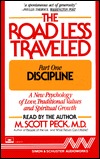
WHO IT'S FOR: People looking for a perspective on meaning in life. People are interested in the "behind-the-scenes" working of therapy.
Several Internet sites rate The Road Less Traveled as the most read self-help book ever. Peck has wisdom and depth to spare on the topics of psychotherapy and human fulfillment. He offers a fundamental jumping-off point to anyone hoping to improve their life, whether through therapy or introspection. There are some cautions. Peck can by turns be loving then judgmental toward therapy patients. His language choice and lack of sympathy at times are cringe-worthy. He puts forth questionable opinions on boundaries as well, over-estimating (in my opinion) the degree of importance and control the therapist exercises in the patient's progress. He uses that importance to justify breaking well-established standards of professionalism and ethics in the counseling field. Finally, the last section, which addresses his spiritual beliefs, meanders. There are valuable nuggets to be mined, but they're buried within some bizarre musings. At the end of the day, I'm aware I'm standing on the shoulders of a giant. Peck wrote this book in the '70s. Therapy has evolved quite a bit since then. Professionals brave enough to put forth their theories and thoughts are to be commended -- they push us forward. And Peck, whatever his imperfections, clearly comes from a place of courage and love serving not only as teacher but example for us all.
Several Internet sites rate The Road Less Traveled as the most read self-help book ever. Peck has wisdom and depth to spare on the topics of psychotherapy and human fulfillment. He offers a fundamental jumping-off point to anyone hoping to improve their life, whether through therapy or introspection. There are some cautions. Peck can by turns be loving then judgmental toward therapy patients. His language choice and lack of sympathy at times are cringe-worthy. He puts forth questionable opinions on boundaries as well, over-estimating (in my opinion) the degree of importance and control the therapist exercises in the patient's progress. He uses that importance to justify breaking well-established standards of professionalism and ethics in the counseling field. Finally, the last section, which addresses his spiritual beliefs, meanders. There are valuable nuggets to be mined, but they're buried within some bizarre musings. At the end of the day, I'm aware I'm standing on the shoulders of a giant. Peck wrote this book in the '70s. Therapy has evolved quite a bit since then. Professionals brave enough to put forth their theories and thoughts are to be commended -- they push us forward. And Peck, whatever his imperfections, clearly comes from a place of courage and love serving not only as teacher but example for us all.